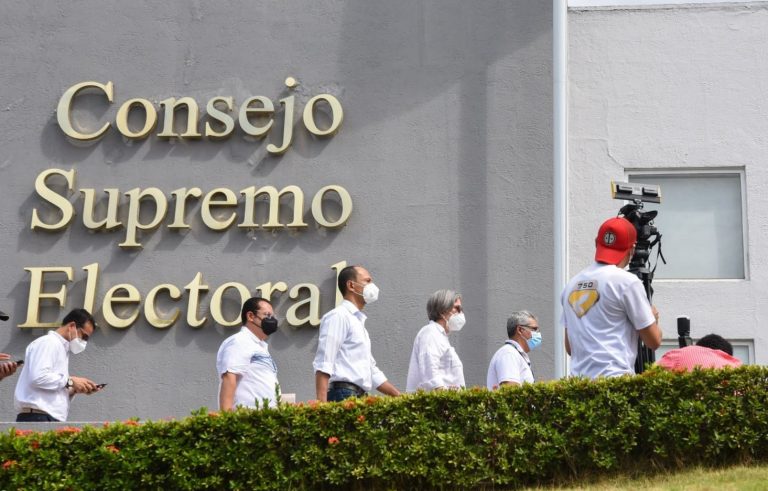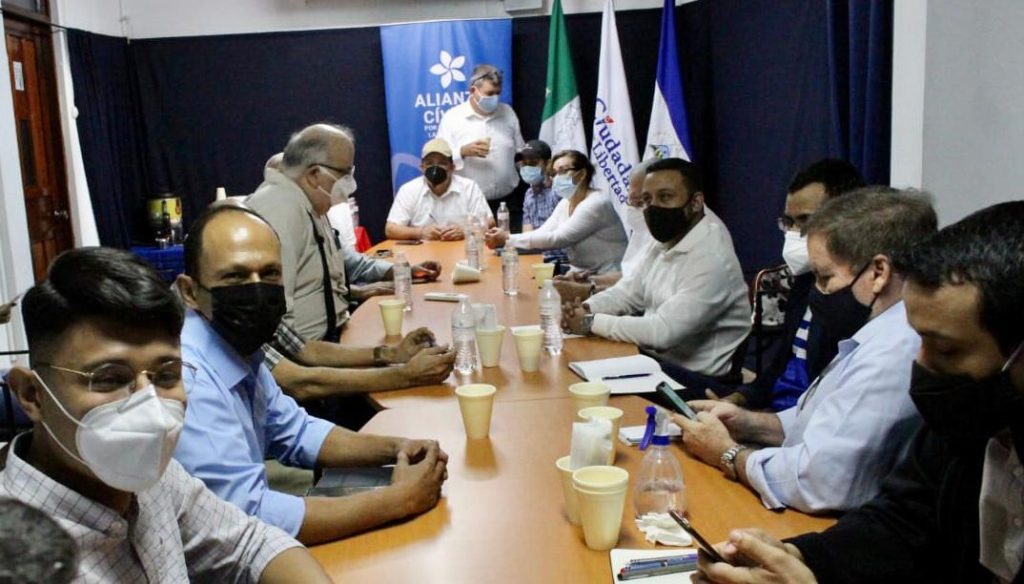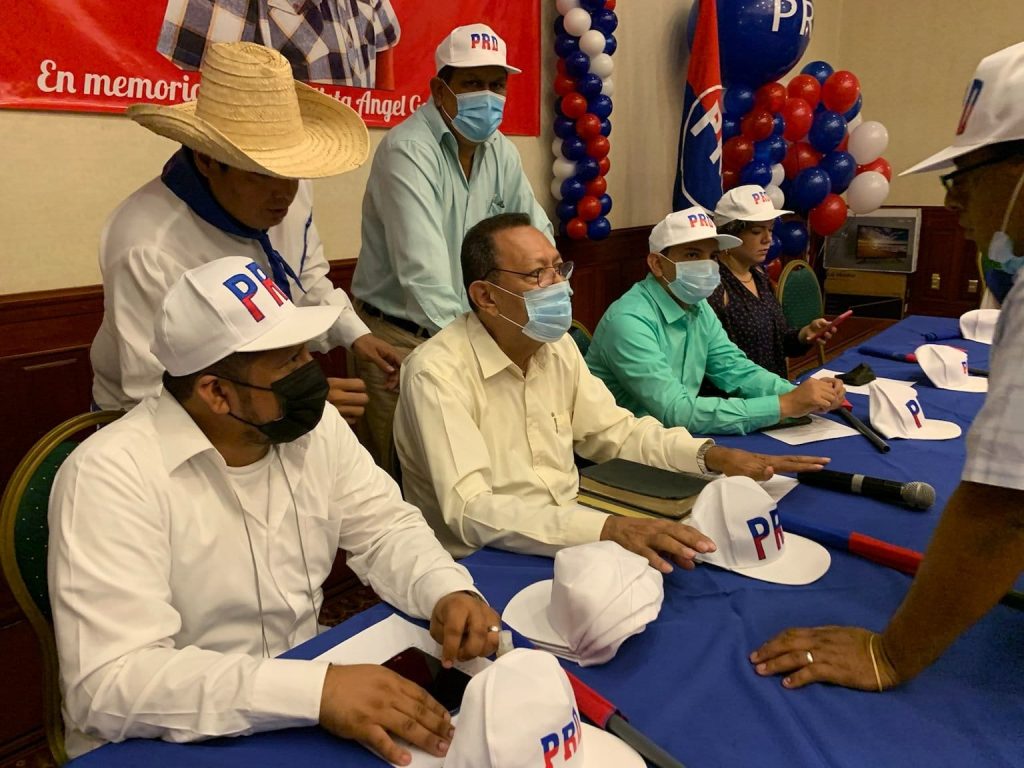26 de mayo 2021

Children of Exile: The Births “Sowing Hope” in the Camp of Nicaraguan Farmers

PUBLICIDAD 1M
PUBLICIDAD 4D
PUBLICIDAD 5D
Elections are shaping up to be a four-way race: FSLN, with control of the Supreme Electoral Council; "collaborationist parties"; and divided opposition

Elections are shaping up to be a four-way race: FSLN
Time is running against Nicaraguan opposition leaders, who, after the failure of an electoral alliance, are analyzing a “political agreement” that would allow for unity with reservations.
If they do not reach a successful conclusion, the next elections will be settled in a four-way contest: the Sandinista Front, on one side; a group of collaborationist parties, on the other; and the great blue and white majority split in two: the Citizens' Alliance with Citizens for Liberty (CxL) on one hand, and the National Coalition with the Democratic Restoration Party (PRD), on the other. Thus, this is the best scenario for the continuity of Daniel Ortega and Rosario Murillo in power, in the context of elections under a police state and with the electoral machinery controlled by the FSLN.
Political analysts agree that the recent electoral reform and the election of magistrates of the Electoral Power, who are close to the ruling party, complicate a possible triumph of the opposition; and now, the division of the blue and white vote will facilitate the materialization of an electoral fraud even more, as national and international organizations have already warned.
"Here (in Nicaragua) there will basically be an election where it is already known who is going to win. The rules of the game have been defined in such a way that there is only one winner, with a first and last name: the Sandinista Front with Daniel Ortega," assured Nicaraguan political scientist Manuel Orozco, director of the Center for Migration and Economic Stability in Washington, DC.
He said that in order to "unmask" this fraud, the opponents need to "win" with a difference of "more than 200,000 votes".
"All polls show that the popularity of the Sandinista Front and Daniel Ortega has been declining and not rising; so the problem is that the fraud already exists, and to prove it, it is necessary to truly identify a gigantic electoral difference, so that it is impossible for Ortega to hide it", explained the political scientist during an interview with the program Esta Noche.
Nicaraguan sociologist and researcher Elvira Cuadra, exiled in Costa Rica, explained that the upcoming elections do not meet "the conditions for citizens to exercise their vote in full freedom", because the entire electoral system "is controlled by Ortega"; the recent reforms "did not correct the perversions but rather aggravated them", and "a policy of repression and the de facto state of exception is maintained over the citizenry, which prevents them from exercising fundamental rights such as the right to mobilization and freedom of expression".
"Under these conditions, no opposition political force has a chance against the Ortega-Murillo. So, it does not matter in how many factions the elections are held. The results are predefined", stressed Cuadra, although she emphasized that the opposition division "is a facilitating factor for Ortega".
She added that "the division may result in a Legislative Power without an important opposition force, which could serve as a counterweight to Ortega". At present, the National Assembly is dominated by the Sandinista Front -with 71 deputies out of 92-, and also counts with the collaboration of other parties, becoming a steamroller in favor of Ortega's laws.
For weeks, members of the National Coalition and the Citizens' Alliance slowly tried to negotiate an electoral alliance for the elections of next November 7; however, all efforts were fruitless and no sector demanded concrete results.
The Supreme Electoral Council (CSE), controlled by Orteguismo, shook the political scenario on Thursday, May 6, with the disclosure of an electoral calendar which, as a first immediate effect, established Wednesday, May 12 as the deadline for the registration of electoral alliances. The announcement caused the different political actors to desperately try to reach, in six days, an agreement that had not been reached for months.
The negotiations of those six days were dominated by bickering, accusations and mutual disqualifications between both opposition blocs. The Citizens for Liberty party (CxL), of the Citizens Alliance, and the Democratic Restoration Party (PRD), of the National Coalition, are the main targets of the opposition failure, as they were responsible for signing the electoral alliance.
The CxL, headed by Kitty Monterrey, registered an electoral alliance with the Partido Movimiento Unidad Costeña (Pamuc) on May 12, called: "Alianza Ciudadanos por la Libertad".
In view of the failed electoral alliance, leaders of both blocks now speak of a "political alliance", whose success is subject to the organizations of the National Coalition deciding to separate and join the Citizens' Alliance. The situation is being analyzed by each one of the members of the Coalition, for which reason there is still no joint statement.

Representatives of the National Coalition and the Citizen Alliance met this Monday, May 10 at the headquarters of the CxL. Photo: Courtesy
"As a platform (National Coalition), so far, we are not considering this proposal (of political alliance) since it was impossible to reach a transparent, flexible and joint consensus on basic and minimum points for an electoral alliance", commented Alexa Zamora, member of the Political Council of the National Blue and White Unity (UNAB).
"I cannot imagine what would happen if we were to register within the structures of this party (CxL), given that this would imply the disappearance of the National Coalition and that we would have to submit ourselves to the rules of the game of Mrs. Monterrey", she added.
Óscar Sobalvarro, vice-president of CxL, assured that the Citizens' Alliance keeps a space open for the members of the Coalition, although he clarified that they would be accepted "under the same conditions that the Civic Alliance came: without asking for anything, other than for the love of Nicaragua".
"We are open to listen to any topic they want to discuss with us, in the case of the Peasant Movement we have been very open because we understand that the peasant is liberal", he pointed out.
Sobalvarro indicated that, within the Citizens' Alliance, CxL caters to political parties, and the Civic Alliance to social movements or civil society organizations, such as UNAB. However, CxL has talked bilaterally with the Movimiento Campesino "because they are liberals".
José Dávila Membreño, executive director of Alianza Cívica, said that negotiations with UNAB "are quite slow", although they will continue to insist because they are interested in civil society being united.
An eventual political alliance would leave the PRD in limbo, since it would not be among the organizations party to the agreement. Besides, this party would lose its legal status if it does not present a candidate in the next elections, which it would do alone, if the other members of the Coalition join the Alliance of Citizens for Freedom.

On May 15, the PRD signed a de facto electoral alliance with organizations of the National Coalition. Photo taken from 100% Noticias.
Regarding this party, Sobalvarro was categorical: "The PRD no longer counts here. It is a party that serves the interests of the Government; it lied to the population, it lied to its allies".
Criticisms against the PRD have also arisen from within its opposition platform. Medardo Mairena, presidential pre-candidate on behalf of the Movimiento Campesino, declared to the newspaper La Prensa: "I believe that within the Coalition itself, the PRD failed us and that is the disagreement there is... if there is no loyalty among ourselves, it is obvious that we cannot feel represented in a political party".
Tamara Dávila, rotating coordinator of the National Coalition, indicated to the media that, in a meeting last Wednesday night, they "rebuked" the leaders of the PRD and pointed out to them that they made "a mistake" in not responding to a call made by Kitty Monterrey, to attend a meeting that day.
Despite the criticisms against the PRD, the leaders of UNAB - Dávila and Zamora - have assured that the National Coalition would run in the 14th box of this party in the elections. Furthermore, the PRD is the only party with legal status within the opposition platform, after the indigenous party Yatama withdrew from the block, due to the expulsion of congressman Brooklyn Rivera, who voted in favor of the reelection of Sandinista magistrate Lumberto Campbell in the National Assembly.
The potential political alliance also faces a deadline to materialize. The electoral calendar establishes that, between July 28 and August 2, the political parties and electoral alliances must present and register a provisional list of their candidates for president and vice-president; national and departmental deputies; and deputies to the Central American Parliament (Parlacen).
Sources of both blocs agree that the political alliance must be formed before they initiate their processes of selection of candidates separately, since it will be "impossible" to coordinate the lists chosen by the bases afterwards.
"There are two times in this (political alliance): before the selection of the (presidential) candidate; if there is a decision to participate with their pre-candidates it should be now, immediately", Sobalvarro sentenced.
He added that if they do not do it at that moment, they have two months to be able to integrate them, but "under other conditions".
The vice-president of CxL assured that, in case of a political alliance, the Alianza Ciudadana would not change its mechanism to choose the presidential candidate, but that the other pre-candidates will register in the internal contest and will compete together with the four presidential aspirants of the platform: Juan Sebastián Chamorro, Arturo Cruz, Noel Vidaurre and Américo Treminio.
The mechanism for the selection of the presidential candidate establishes two debates and two polls to determine the winner. According to Sobalvarro, this process was suspended to wait for the result of the negotiations with the PRD and the National Coalition.
"We intend for the debates to be televised and broadcasted on radio, in media with national coverage", commented the politician, who emphasized that they still do not have a date set for the debates, and that the polls will be done after each forum. "We hope to define the dates this week".
Zamora pointed out that the Coalition suspended the issue of candidate selection weeks ago, in order to focus on the materialization of the electoral alliance.
"We are going to determine the mechanism by which independent candidacies of people who wish to join the Coalition can be presented; and to establish a definitive period so that this process of democratic selection of candidates is carried out by consensus and in common agreement of all the parties", she emphasized.
According to the leader, the only thing that has been agreed on is that the election of the presidential candidate will be made through a mixed mechanism (in person and virtual), although the percentage that each modality will contribute to the total is yet to be defined.
"It was being discussed whether the binding surveys will be open to all citizens. We are also waiting for the technical proposal, to know if it will be done by department; by regions; or a simultaneous national consultation mechanism", emphasized Zamora.
The presidential pre-candidate of the Alianza Ciudadana, Arturo Cruz, was confident that the so-called "useful vote" will favor the candidates of this opposition bloc.
"Looking to the future (I see) three electoral platforms, that of Alianza Ciudadana, on one side; that of the PRD, on the other side; and that of the PLC-ALN on the other, it seems to me that this will be inevitable (...) It is a scenario that personally does not worry me, because I am a believer in a useful vote", said Cruz in an interview on Channel 10.
"The great majority of Nicaraguans already know who to vote for and they are going to vote for the useful vote", affirmed the presidential aspirant. In the same sense, Sobalvarro stated that the election will only be two-sided: "the Sandinista Front and us (CxL), I do not see another (opposition) bloc".
In an opinion article, journalist Carlos Fernando Chamorro, director of CONFIDENCIAL, recalled that recent surveys "have detected an important percentage of blue and white voters who, just as they reward unity through votes, may punish division with their abstention".
"The historical experience of 2006 shows that, in the absence of a charismatic opposition leadership, the electorate was divided into two Liberal blocs (ALN and PLC) and the MRS, which together totaled 62% of the electorate and there was no 'useful vote' that achieved 35% or 40% to prevent Ortega's triumph in the first round", wrote Chamorro.
A political analyst, linked to the new attempt for unity and who preferred to omit his name, valued that "the only possibility of defeating Ortega is the massive vote, which is not given by a ballot".
"The vote will be massive if the candidacies are attractive, it is not because someone from outside says that my ballot is the best. The source pointed out that the issue is for there to be a candidate that allows citizens to have empathy, that they are willing to take the risk of voting and defend their vote".
This article was originally published in Spanish in Confidencial and translated by Ana María Sampson
Archivado como:
PUBLICIDAD 3M
Confidencial es un diario digital nicaragüense, de formato multimedia, fundado por Carlos F. Chamorro en junio de 1996.
PUBLICIDAD 3D